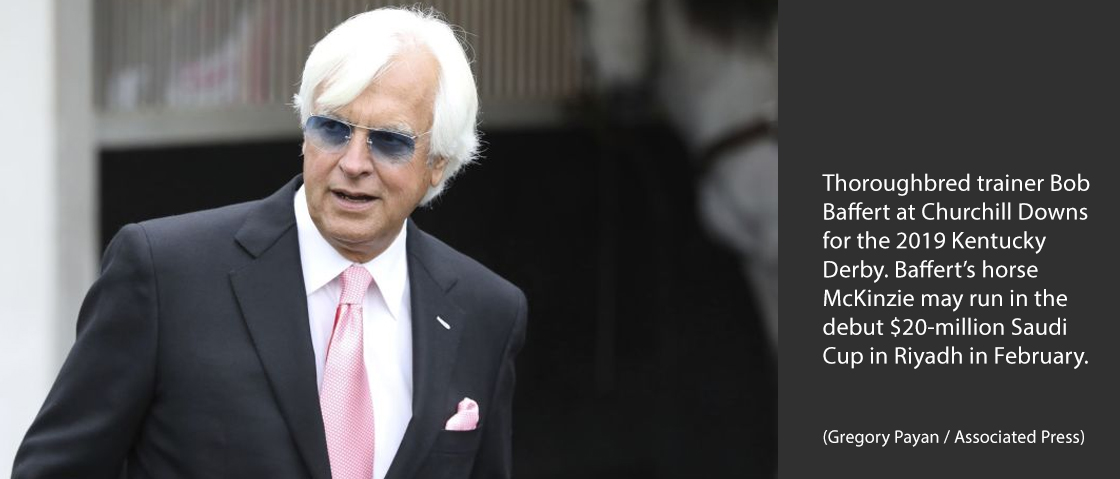Politics and sports don’t mix well. Just ask Colin Kaepernick. But sometimes politics intrudes on athletic competition in a way that can’t be ignored. Thoroughbred racing, already grappling with a terrible track record of horse deaths, is enveloped in yet another political and moral catastrophe that few in the business acknowledge.
For more than two decades, horse racing has been influenced heavily by the Arab dynasties of the Persian Gulf, notably Dubai, a city-state in the United Arab Emirates. Through their rich races in March, including the $10-million Dubai World Cup, and their enormous investment in purchasing horses in the United States and Europe, the Emiratis have a vivid presence in the sport. This extraordinary immersion is led by Sheik Mohammed bin Rashid al Maktoum, the ruler of Dubai.
Now the Saudis are entering this glittering arena with the $20-million Saudi Cup in February. Top trainers such as Hall of Famer Bob Baffert are reportedly heading to Riyadh. According to news reports, the kingdom is not only putting up a record purse, but it will also foot the bill for getting the horses to King Abdulaziz Racetrack in Riyadh. The largesse is hard to resist.
It should be resisted, however. Both the Emirates and Saudi Arabia are repressive states that have fomented and supported large-scale violence against civilians in Yemen, among other hot spots in the region. The Saudis have paid for terrorist militias in Syria and jihadi-oriented schools all over the world. The Saudi war against Yemen, until recently braced by the Emiratis(and still aided by the US), is considered one of the world’s worst humanitarian disasters, with tens of thousands killed and millions on the brink of starvation.
Internal repression is equally disturbing. Saudi Arabia is in effect a totalitarian state. Its Shiite minority is marginalized and silenced. It imports workers from Pakistan (as does Dubai) who are treated like indentured servants. Women’s rights are almost nonexistent. According to the CIA, the Saudi crown prince, Mohammed bin Salman, ordered the murder of a US-based journalist, Jamal Khashoggi, last year.
And yet, the kingdom has gotten a nearly free pass in US political culture because of its aggressive public relations efforts. According to the Center for Responsive Politics, in 2018 Saudi Arabia spent $34 million lobbying in the United States alone. After Khashoggi’s killing, Riyadh stopped promoting the crown prince as a dynamic, young reformer and turned sharply toward “soft power” efforts — including what’s known as sportswashing.
The Saudi Cup is one of the splashiest of those efforts, and the American (and European) horse racing industry implicitly endorses the Saudis’ charm offensive with their uncritical participation in the race. One can imagine the kingdom rehabilitating the prince on the world stage as he awards the trophy to the winning trainer and owner of the Saudi Cup, to wide applause and excellent publicity. As Dubai’s World Cup has shown, chumminess with European and American elites, built around a tony horse operation, goes some distance toward elevating even a government known for its dreadful human rights record.
At some point, the leading lights of the racing industry will have to take moral responsibility for lending legitimacy to thuggish regimes like the Emirates and Saudi Arabia. What does Mohammed bin Salman have to do to earn their opprobrium? Genocide, terrorism, oppression and murder are already afoot, so apparently the answer is that no crime will earn the racing industry’s disfavor. If it’s all about money, the Saudis’ oil economy can keep pumping out plenty of that.
We don’t expect horse trainers, jockeys and owners to be statesmen. We have a reasonable expectation, however, that they shouldn’t be collaborators, either.
John Tirman is executive director of the MIT Center for International Studies.




